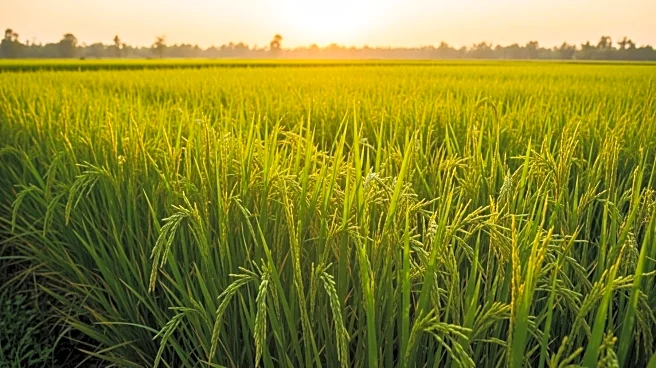What's Happening?
President Ratu Naiqama Lalabalavu has raised concerns about the effectiveness of a $150,000 investment by Fiji Rice Limited aimed at enhancing rice self-sufficiency in Fiji. During the Rice Farmers President Awards 2024, he emphasized the importance of agriculture to Fiji's economy and the need to reduce rice imports for better food security and economic stability. The President urged the Ministry of Agriculture, industry leaders, and farmers to develop practical solutions to expand rice farming and achieve agricultural independence. Minister for Environment and Climate Change, Mosese Bulitavu, highlighted efforts to address climate impacts on farming, including securing international funding for climate-smart agriculture. Minister for Agriculture Tomasi Tunabuna noted that rice is vital to Fiji's food security and cultural identity, with significant imports exposing the country to global price fluctuations.
Why It's Important?
The President's concerns underscore the critical role of agriculture in Fiji's economy and the challenges of achieving self-sufficiency in rice production. With 88% of rice being imported, costing $42 million in 2022, Fiji is vulnerable to global market changes. Enhancing local production could stabilize food security and reduce economic exposure. The government's focus on climate-smart agriculture and modern farming techniques aims to address environmental challenges and improve yields. Success in these initiatives could lead to greater economic independence and resilience against external price shocks, benefiting farmers and the broader economy.
What's Next?
The Ministry of Agriculture plans to continue its efforts to boost local rice production through training, mechanization, and improved seed varieties. Collaboration with international partners for climate-smart agriculture funding is expected to continue, addressing environmental challenges like droughts and saltwater intrusion. Stakeholders may need to assess the effectiveness of the current grant and explore additional investments or policy changes to achieve the desired self-sufficiency. The President's call for action may prompt further discussions and initiatives among government agencies, industry leaders, and farmers.
Beyond the Headlines
The push for rice self-sufficiency in Fiji highlights broader issues of food security and economic independence in small island nations. The reliance on imports for staple foods can have significant cultural and economic implications, affecting national identity and stability. The focus on climate-smart agriculture reflects a growing awareness of environmental challenges and the need for sustainable farming practices. Long-term success in these areas could serve as a model for other countries facing similar challenges, promoting resilience and sustainability in agriculture.








